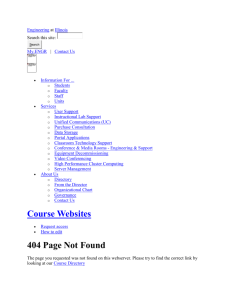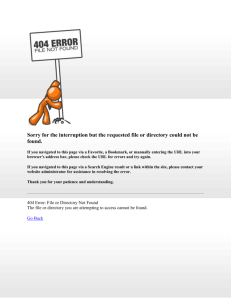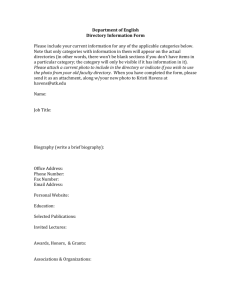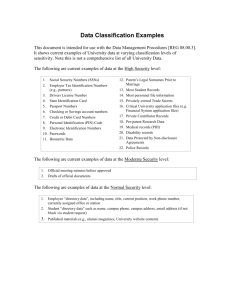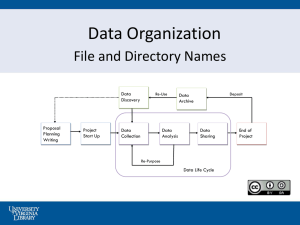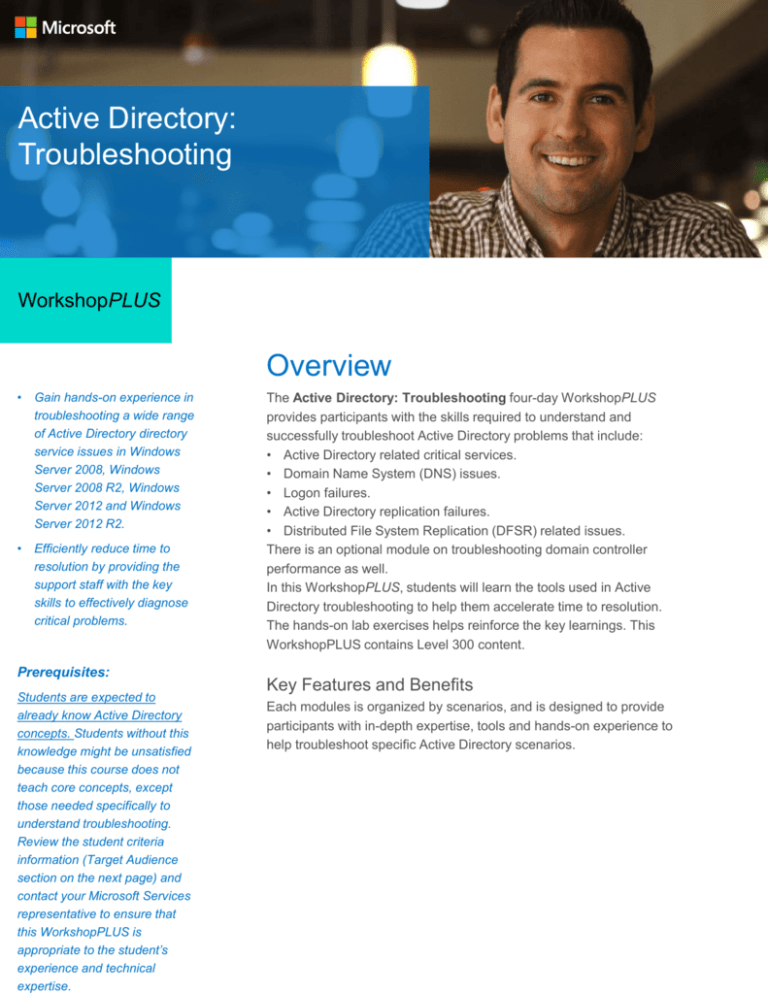
Active Directory:
Troubleshooting
WorkshopPLUS
Overview
•
Gain hands-on experience in
troubleshooting a wide range
of Active Directory directory
service issues in Windows
Server 2008, Windows
Server 2008 R2, Windows
Server 2012 and Windows
Server 2012 R2.
•
Efficiently reduce time to
resolution by providing the
support staff with the key
skills to effectively diagnose
critical problems.
Prerequisites:
Students are expected to
already know Active Directory
concepts. Students without this
knowledge might be unsatisfied
because this course does not
teach core concepts, except
those needed specifically to
understand troubleshooting.
Review the student criteria
information (Target Audience
section on the next page) and
contact your Microsoft Services
representative to ensure that
this WorkshopPLUS is
appropriate to the student’s
experience and technical
expertise.
The Active Directory: Troubleshooting four-day WorkshopPLUS
provides participants with the skills required to understand and
successfully troubleshoot Active Directory problems that include:
• Active Directory related critical services.
• Domain Name System (DNS) issues.
• Logon failures.
• Active Directory replication failures.
• Distributed File System Replication (DFSR) related issues.
There is an optional module on troubleshooting domain controller
performance as well.
In this WorkshopPLUS, students will learn the tools used in Active
Directory troubleshooting to help them accelerate time to resolution.
The hands-on lab exercises helps reinforce the key learnings. This
WorkshopPLUS contains Level 300 content.
Key Features and Benefits
Each modules is organized by scenarios, and is designed to provide
participants with in-depth expertise, tools and hands-on experience to
help troubleshoot specific Active Directory scenarios.
Target Audience:
Technical Highlights
To ensure the high
quality knowledge
transfer students
expect from this fourday WorkshopPLUS,
class size is limited to
a maximum of 16
students who meet
the following criteria:
• Senior or top-level
IT staff possessing
at a minimum
MCSE-level
certification in
Microsoft Windows
Server 2012
and/or Microsoft
Certified IT
Professional
(MCITP )in
Windows
Server 2008.
• Operatingenvironment
infrastructure
architects with a
good
understanding of
Active Directory.
• Administrators of
computers running
Windows Server
2012/ Windows
Server 2008 with
good
understanding of
Active Directory.
• Escalation support
staff (top-tier only).
After completing this course, students will be able to understand:
• The dependencies of Active Directory on DNS, and how to
diagnose and troubleshoot DNS issues including Windows Server
2008 read-only domain controller (RODC) features.
• How to identify Client Logon Authentication problems, such as
Tokensize and Kerberos issues.
• The processes supporting Active Directory replication and
troubleshooting.
• How to diagnose and correct common DFSR problems that lead to
System Volume (Sysvol) replication issues.
• How to identify and troubleshoot key domain controller performance
issues (optional, as per time availability).
2015 © Microsoft Corporation. All rights reserved.
This data sheet is for informational purposes only.
MICROSOFT MAKES NO WARRANTIES, EXPRESS OR IMPLIED, IN THIS SUMMARY
Syllabus
Hardware
Requirements:
Contact your TAM if the
necessary hardware
needs to be provided.
If you are attending an
Open enrollment
WorkshopPLUS, the
hardware will be
provided for you.
This WorkshopPLUS runs for full four days. Students should anticipate
consistent start and end times for each day. Early departure on any day is
not recommended.
Module 1: Introduction to Active Directory Troubleshooting. This
module introduces the basic methodology for troubleshooting Active
Directory issues.
Module 2: Troubleshooting Critical Services and Flexible Single
Master Scenarios. This module introduces students to the Active
Directory Critical services. The module covers Flexible Single-Master
Operation (FSMO) roles and key troubleshooting scenarios.
Module 3: Troubleshooting Active Directory Issues Related to DNS.
This module explains:
• Why Active Directory is reliant on DNS.
• How Active Directory uses DNS—including the symptoms, causes, and
resolution to DNS problems.
Note: This WorkshopPLUS assumes that the student is familiar with DNS.
Module 4: Troubleshooting Client Logon and Authentication. This
module guides students through common logon scenarios for client logon
and authentication issues, including Secure Channel, Kerberos, and
Tokensize problems. The module also covers auditing Active Directory and
delegation of administration.
Module 5: Troubleshooting Active Directory Replication. This module
focuses on the replication topology and the tools and methods used to
diagnose and resolve Active Directory replication issues. This module will:
• Discuss a wide range of troubleshooting scenarios along with their
solutions.
• Build on the troubleshooting tools covered in previous modules.
• Explain RODC replication and troubleshooting.
• Discuss common issues in depth with update sequence number (USN)
Rollback, Lingering Objects, Secure Channels and trusts.
Module 6: Troubleshooting DFSR. This module covers the role of DFSR
in an Active Directory domain and the replication process. It also discusses
a range of troubleshooting scenarios, tools, and solutions for DFSR.
Module 7 (Optional, as time allows): Troubleshooting Domain
Controller Performance. This module focuses specifically on typical
performance issues and causes. It also:
• Identifies operating system performance and hardware issues.
• Discusses third-party drivers and agents issues.
• Explains performance-troubleshooting tools.
Many common troubleshooting real-world scenarios are introduced and
discussed in depth to help students swiftly apply the learnings in their work
environment.
2015 © Microsoft Corporation. All rights reserved.
This data sheet is for informational purposes only.
MICROSOFT MAKES NO WARRANTIES, EXPRESS OR IMPLIED, IN THIS SUMMARY


